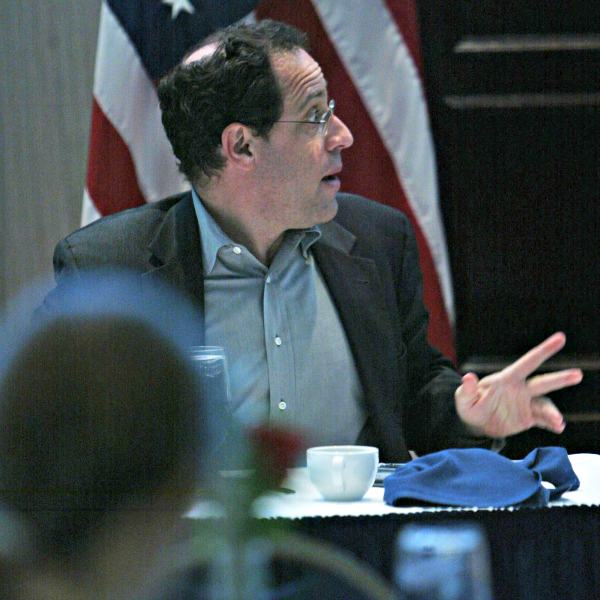Why a ‘Smart Growth’ Agenda in This State Arouses Tea Party, Property Rights Activists
Kevin Mooney /
One of the biggest sources of grants in the nation’s smallest state rakes in taxpayer dollars while advancing centralized planning of environmental controls that burden entrepreneurs and taxpayers alike, its critics charge.
The Rhode Island Foundation received hundreds of thousands of dollars from taxpayers over the past few years even as it awarded money to promote “sustainable development” and “smart growth” that undermine job creation and the best interest of taxpayers, say public officials and citizen-activists familiar with the foundation’s plans.
To commemorate its 100th anniversary, the Rhode Island Foundation touts a “diverse range of projects” built around Centennial Community Grants. But its critics charge that the nonprofit institution has become devoted exclusively to pushing a progressive, even radical, agenda.
“This is all about HUD bureaucrats in Washington, D.C., working to take away local control on zoning so they can determine who lives where,” tea party activist Mike Puyana says of a “smart growth” plan backed by the foundation.
With almost $1 billion in assets, the foundation bills itself as Rhode Island’s largest grant-maker, awarding more than $30 million a year, according to annual reports. Tax records show that the foundation concentrated its most recent donations on left-of-center organizations, with a particular emphasis on environmental causes.
These organizations include Earthjustice, EcoRI News, the Climate Action Network, the Environmental Justice League of Rhode Island, and Grow Smart Rhode Island. Each has received tens of thousands in donations from the Rhode Island Foundation, according to the most recent tax forms.
Other left-leaning recipients of the foundation’s largess include Planned Parenthood branches in Rhode Island and Massachusetts; Direct Action for Rights and Equality, an anti-capitalist “social justice” group; the Economic Progress Institute, a Rhode Island-based progressive research group; and the Rhode Island Coalition Against Gun Violence, which seeks new gun controls.
Rhode Islanders who express concern over the Rhode Island Foundation’s penchant for funding liberal causes have been particularly critical of the nonprofit’s support for environmental groups standing behind a project called RhodeMap Rhode Island.
They say RhodeMap Rhode Island opened the door for centralized planners in Washington, D.C., to gain control over housing and development at the local level.
The U.S. Department of Housing and Urban Development established funding for RhodeMap RI, as it is known, through a Sustainable Communities Regional Planning Grant in 2011 offered as part of the Federal Partnership for Sustainable Communities. This partnership includes HUD, the U.S. Environmental Protection Agency, and the U.S. Department of Transportation. The Rhode Island Division of Planning is responsible for administering RhodeMap RI.
A Brookings Institution scholar involved in making that road map a reality held a top HUD post during the Clinton administration and later advised the Obama administration.
But what is RhodeMap RI, exactly?
Officials in the state’s Division of Planning describe RhodeMap RI as a statewide strategy to bolster the economy and meet “current and future housing needs” while planning for “future growth through the development of integrated plans and guidance consistent with existing strategies for transportation, land use and environmental protection.”
Code for Big Government?
That’s one definition.
Grow Smart, which received $112,000 from the Rhode Island Foundation in 2013, identifies itself as a “proud member” of a consortium of public and private entities that back RhodeMap RI. A nonprofit, Grow Smart describes itself as devoted to “sustainable and equitable economic growth.”
Though Grow Smart has vigorously defended the RhodeMap RI program, its own definition of the effort is somewhat nebulous. The program is described on the Grow Smart website, in part, as “a unified economic development strategy for the state that integrates business growth with land use and transportation choices.”
But the group’s definition of smart growth, which is at the core of the RhodeMap program, is a bit more exacting: Smart growth simultaneously combines “economic development and jobs, strong neighborhoods and healthy communities” as part of an overarching strategy.
That sounds benign enough. But Mark Zaccaria, former chairman of the state Republican Committee, says he is concerned about the “fine print” folded inside the HUD grants and the ramifications for self-government and local autonomy.
Under state law, Rhode Island–the nation’s smallest state geographically but No. 43 by population–has a “comprehensive plan” that must be updated every five years. RhodeMap RI builds on the criteria set by the state plan, Zaccaria says.
“But the problem is that RhodeMap Rhode Island is being done in strict accordance with HUD’s sustainable development agenda,” says Zaccaria, now active with the Property Rights Alliance of Rhode Island. He adds:
The ultimate goal is to have something like 75 percent of our land mass go back to wilderness and to pack the population into certain areas with restrictions on the kind of housing that is permitted. There’s also a certain emphasis on public transportation, which means personal, individual transportation means like automobiles are now considered a bad thing, and you’re going to see taxes and regulations on automobiles.

Bruce Katz speaks at a 2008 event at the Brookings Institution in Washington, D.C. (Photo: Carrie Devorah/WENN/ Newscom)
Seven Targets for Taxpayer Dollars
In Zaccaria’s opinion, the Rhode Island Foundation is “populated with liberals” who are keen on pushing what they call smart growth and sustainable development.
So, he says, it’s not surprising to see the foundation step forward with substantial financial support for a left-leaning environmental agenda.
“The foundation was originally founded [in 1916] for the purpose of historical preservation, but it has morphed into something else in recent years,” Zaccaria says.
The Rhode Island Foundation provided partial funding for a $1.3 million study from the Brookings Institution that critics view as an extension of Grow Smart’s green initiatives. The foundation and its team appear at the top of a list of “major stakeholders” consulted for the report.
Rhode Island Gov. Gina Raimondo, a Democrat who took office in January 2015, commissioned the study. Titled “Rhode Island Innovates,” it was released last week and adopted by the Rhode Island Economic Development Planning Council during a ceremony held at the foundation’s offices in Providence. (See the full report here.)
The Brookings Institution report, produced with Battelle, the Columbus, Ohio-based research and development giant, identifies seven industries worthy of private and public investment to spur economic growth in the Ocean State: biomedical innovation; information technology software, cyberphysical systems, and data analytics; defense shipbuilding and maritime; advanced business services; design, food, and custom manufacturing; transportation, distribution, and logistics; and arts, education, hospitality, and tourism.
Battelle and Brookings, the Washington-based think tank, recommend public and private spending in those areas totaling, and possibly exceeding, $100 million.
Bruce J. Katz, a national urban development expert who founded Brookings’ Metropolitan Policy Program, last week said he is “bullish” on Rhode Island’s prospects. He has urged businesses to back government efforts aimed at recharging the economy.
In response to critics who see too large of a role for government, Katz tells reporters that partnerships between business and government have produced tangible results in other parts of the country. The Providence Journal quoted Katz as saying Jan. 19:
If I’m a family living in Rhode Island, I want those companies and clusters and universities getting better at their job because I know I’m either going to be able to get a job in one of those companies, or clusters, or I’m going to have the knock-off effect.

Mike Puyana, president of the Rhode Island Tea Party, at a rally in April 2009. (Photo: Rhode Island Tea Party Facebook)
‘Too Cozy’ With Governor, Green Interests?
Where the Brookings Institution report sees opportunities, Puyana, president of the Rhode Island Tea Party, sees “a far too cozy relationship” among Raimondo, federal agencies, the Rhode Island Foundation, and special interests funded through it.
Katz, the first “centennial scholar” at Brookings, was senior counsel and then staff director for the U.S. Senate’s subcommittee on housing and urban affairs. He held top positions at the Department of Housing and Urban Development: He was chief of staff to Secretary Henry Cisneros during President Clinton’s first term. He returned as senior adviser to Obama’s first HUD secretary, Shaun Donovan, for the first 100 days of the administration.
Katz is not identified as part of the project team on “Rhode Island Innovates,” which cites his work six times, but he helps promote the findings.
Raimondo, a venture capitalist who succeeded Lincoln Chafee as governor and previously was state treasurer, told reporters that the Brookings report was done independently of her administration.
Even so, the recommendations in the think tank’s study will be included in 2016-17 budget proposals the governor is set to present Feb. 2 to the Rhode Island General Assembly.
Brookings spokesmen did not return several calls and emails requesting comment.
A spokesman for the governor, reached Tuesday by The Daily Signal, did not respond by publication time about the state government’s association with the Rhode Island Foundation and some of its favorite progressive causes.
Puyana says:
The Rhode Island Foundation is getting hundreds of thousands of dollars in taxpayer money, and that includes my money, and the money of other taxpayers, which are going to green groups that I would never voluntarily donate my money to since it supports an agenda I don’t think is in Rhode Island’s best interests. If you look at the groups the foundation is funding, it is a who’s who list of every loony left entity that is out there.
The tea party leader specifies Direct Action for Rights and Equality, Earthjustice, and EcoRINews as being on that list.
The state’s Office of the Health Insurance Commissioner has funneled about $600,000 to the foundation since 2013, government records show.
The agenda that most concerns Puyana and other tea party activists is built around smart growth policy goals aimed, he says, at “pushing people out of rural areas and into more highly concentrated, densely packed urbanized communities.”
Towns and municipalities on the receiving end of HUD grants no longer can determine “where and how to distribute affordable housing,” Puyana says, thanks to an obscure provision known as Affirmatively Furthering Fair Housing.
“This is all about HUD bureaucrats in Washington, D.C., working to take away local control on zoning so they can determine who lives where,” he adds. “This is social engineering at its worst, and it is being funded with some of our own money as taxpayers, even though many of us do not support this agenda.”

A tea party rally at the Rhode Island statehouse in April 2009. (Photo: Rhode Island Tea Party Facebook)
Foundation Cites ‘Benefits’ to Residents
Responding to inquiries from The Daily Signal, Chris Barnett, a spokesman for the Rhode Island Foundation, defends his organization’s support for Grow Smart. In an email message, Barnett writes:
For more than a decade, we have supported Grow Smart’s work revitalizing urban areas as a catalyst for economic development. It is one of more than 1,400 organizations working across sectors ranging from education and health care to the arts and the environment that we funded last year. In a state with one million people, we’re sure even someone who finds fault with one of our investments still benefits from our work in many ways.
But legitimate concerns exist about the relationship among the Rhode Island Foundation, the Raimondo administration, and other elements of state government, Giovanni Cicione, founder and chairman of the Stephen Hopkins Center for Civil Rights, tells The Daily Signal.
“What we are seeing now is an end run around certain transparency requirements and ethics requirements,” Cicione says, citing meetings held in private that ordinarily would be public under sunshine laws. He adds:
When the government starts to hide the ball, it makes me nervous. We have people serving in cabinet-level positions without any Senate vetting or confirmation because they are getting paid by a private foundation while working for the state.
Cicione says he has concluded that some members of private-public committees should be registered as lobbyists under the state’s administrative lobbying law.
“There are big-money donors who want to push the smart growth agenda with the state into its administrative and legal structures,” he says. “They are pushing this agenda through the foundation so they don’t have to go through an open and public process.”
Zaccaria, the property rights activist, argues that Rhode Island’s constitution provides cities, towns, and municipalities with “a certain amount of sovereignty” that “nameless, faceless bureaucrats are working to abrogate.”
HUD directives attached to federal grant money are “often in conflict with local zoning laws,” he says.
“The noose hasn’t started to tighten yet, but that time will come.”
Ken McIntyre contributed to this report.
